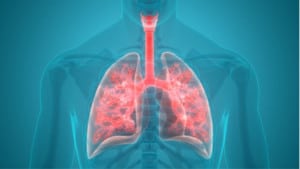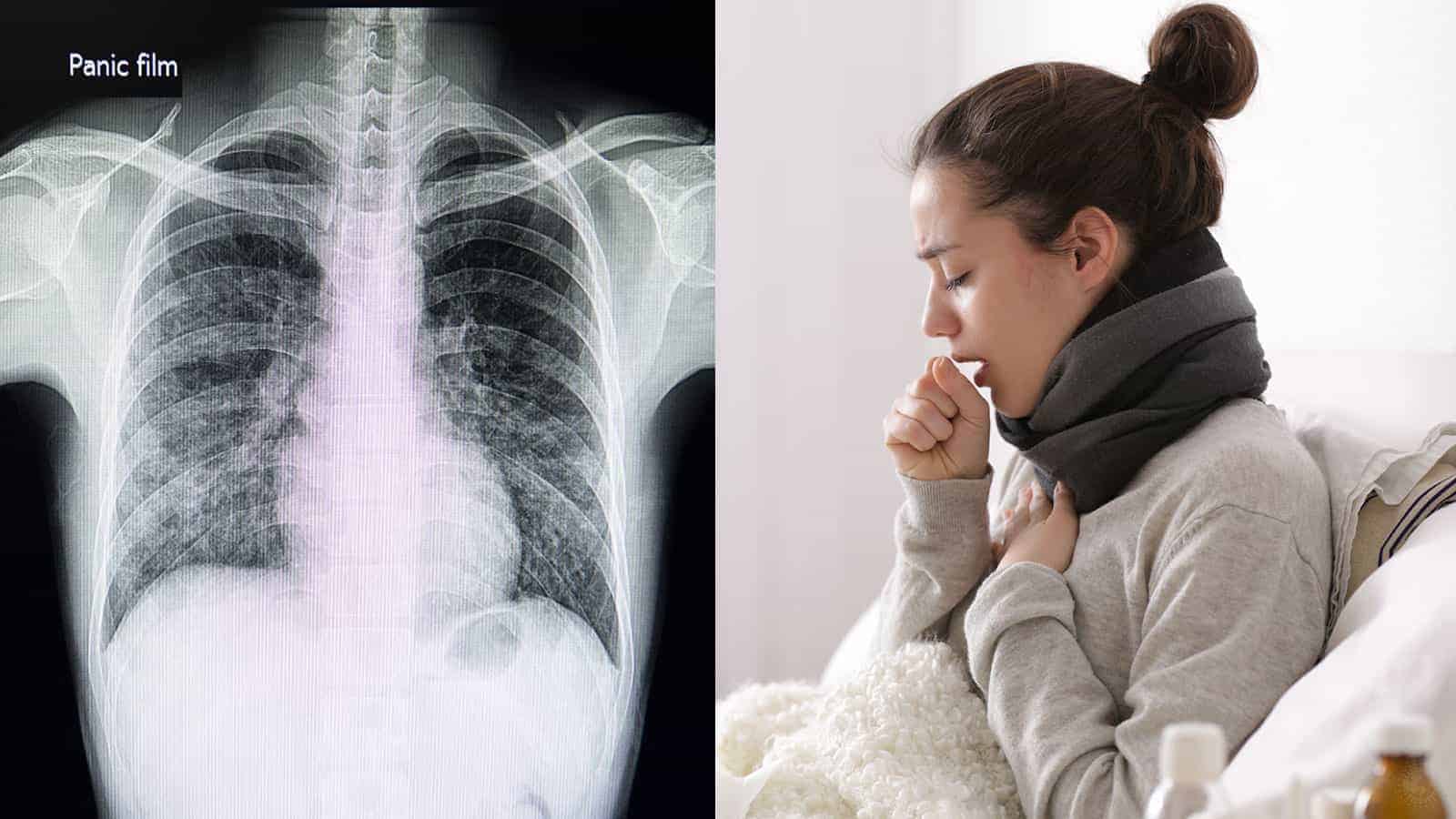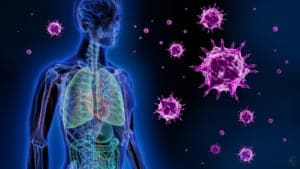Pneumonia is caused by either a virus or bacteria. There are several classifications of pneumonia and over 30 types, but the most common cause stems from a chest cold or flu. The virus is in the body for up to ten days before pneumonia symptoms manifest. The condition lasts from ten to fourteen days and is treated with different chemical medications.
If people suffering from pneumonia symptoms think they just have a bad cold, they could be putting their lives in jeopardy. Not to be too dramatic, but pneumonia is sometimes fatal. To receive treatment early on, you should know these ten pneumonia symptoms..
Know These 10 Pneumonia Symptoms
1. Shortness Of Breath
We take breathing for granted until something happens that makes us force the air into our lungs. When the air simply won’t go in, it means an underlying illness is in place, such as asthma, COPD, allergies, or you’ve just gotten pneumonia.
The lungs are constructed of tubes resembling the branches of a tree called bronchi. These route oxygen through the lungs and take out the carbon dioxide. Located off, these are alveoli. These are responsible for exchanging carbon dioxide for oxygen to and from the bloodstream.
Mucus or sputum is produced in the lungs for lubrication. When too much mucus builds up, the bronchi can’t process incoming oxygen or the resulting carbon dioxide. Shortness of breath happens and is one of the first pneumonia symptoms.
2. Chest Pain
The lungs and heart are encapsulated in the chest wall. Just inside that is a pleuritic sheet protecting the lungs. When lung infections occur, this pleuritic sheet becomes red and inflamed. Anything to do with the chest can feel like a heart attack, but this pleuritic sheet feels different. It burns. Just inhaling can be painful.
Add to this the fact that the alveoli of the bronchial tubes fill with mucus. They’re not soft and pliable anymore. Coughing up the mucus or sputum puts pressure against the pleuritic sheet, which burns. These two together are both dangerous and painful pneumonia symptoms.
3. Fever, Chills, And Sweating
The body was made to operate at a certain temperature for optimal health. When the body temperature soars into a fever, it means the presence of an infection. Fevers are the body’s way of burning off an invading virus or bacterium. If fevers get too high, though, they cause convulsions, which lead to other terrible things.
Chills control the fever and keep it from raging. However, we become cold, so we pile on blankets, which makes us sweat. This dehydrates the body. The fever climbs higher, the chills shake us, and the blankets make us sweat more. It’s a dangerous circle, and one which requires a doctor the instant you suspect you have pneumonia symptoms.
4. Shallow Breathing
Bronchi can fill with mucus, limiting your ability to take deep breaths. The diaphragm can’t expand the lungs, so shallow breaths are all you can take. This is dangerous for two reasons. The first is that a lack of oxygen means a buildup of carbon dioxide. The second is that the inability to breathe deeply is stressful. Anxiety makes the problem worse and can affect the heart.
A lack of oxygen carried deep into the lungs means the mucus can’t be coughed up. The chest pain and shortness of breath can get worse. The carbon dioxide presence is perhaps the most dangerous. When this pneumonia symptom happens, get to a doctor pronto.
5. Cough
Mucus is a substance the body produces to lubricate different things. Sometimes it produces too much, in which case the body sneezes it out, coughs it up, or blows it out the nose. When it’s trapped in the lungs, it must be coughed up.
This mucus will be clear to yellowish in color. This means an infection is present. Ordinarily, mucus is clear to light green in color. This buildup of mucus can be dangerous when you can’t draw in enough breath to cough it up. It will fill the lungs until you can’t breathe. Get to the doctor ASAP.
6. Appetite Loss
It’s normal to have a loss of appetite when you’re sick. It’s doubly hard when you have pneumonia, and you’re blowing your nose, coughing, and the muscles are tired from pushing the mucus out. Add to that not being able to chew, swallow, and breathe at the same time.
The snag to this is that the body isn’t getting the nutrition it needs to strengthen the immune system and fight off the infection. Without the energy that food provides, the body hasn’t the energy of its own.
While the loss of appetite isn’t dangerous, it’s an unnecessary complication and is one of the pneumonia symptoms. It can also be a side effect of some pneumonia medications. Try to get down as much chicken or bone broth as possible along with orange juice. This helps fight off infections and illnesses.
7. No Energy And Fatigue
One of the most worrisome pneumonia symptoms is lack of energy and fatigue. It stands to reason that with the muscles sore from coughing and nose-blowing, the struggle to breathe, and loss of appetite, the body will be worn out. Fatigue is also a side effect of some pneumonia medications.
Fatigue and lack of energy don’t endanger the pneumonia patient like anxiety would. However, if the body is too tired to cough up the mucus or fight off a fever, then the pneumonia symptoms will worsen. It will take longer for the body to fight off the illness.
8. Nausea And Vomiting
Nausea and vomiting are common with fevers, particularly in children. It’s not unusual for kids to experience children vomiting as their bodies work hard to cough up mucus filling their lungs. When the body’s muscles contract intensely to expel the mucus, sometimes the contents of the stomach are expelled as well. While this response is natural, it’s important to monitor hydration, as vomiting can lead to further dehydration. Ensuring that children stay hydrated during this time can help support their recovery.
This makes the pneumonia symptoms worse. A well-hydrated body can fight off infections and make the mucus more fluid and thus more easily expelled. When the stomach can’t even hold water down, the pneumonia is harder to get rid of.
9. Confusion
Part of pneumonia symptoms is confusion. The pneumonia patient will feel dazed. The person won’t be able to walk steadily, reach for something and miss it by a mile, make an informed decision, or even punch in a number into a phone. Part of this confusion is due to fever, part of the nervous system being overcome by pneumonia, and part of some side effects from medications.
The brain is a complex thing, but it can be overcome by certain illnesses or conditions. Pneumonia is one of them. Until the malady is gone, the pneumonia patient should remain in bed unless going to the bathroom. S/he could do her/himself harm by trying to move around.
10. Rapid Heart Beat
When oxygen enters the lungs, it’s carried to the heart. There the blood is oxygenated and then carried throughout the body. The major organs and muscles must have oxygenated blood to function properly. Pneumonia means a serious lack of oxygen getting into the lungs. This makes the heart work harder to pump what little oxygenated blood reaches it into the body.
A rapid heartbeat means that too little oxygen is entering the heart muscle. This is one of the most serious of the pneumonia symptoms in that heart attack and stroke can result. Studies indicate that pneumonia patients are four times more at risk for heart attack or stroke. Pneumonia vaccinations help slow down the risk, but pneumonia patients must see their doctors in order to keep a tight eye on the situation.
Home Remedies For Pneumonia
Pneumonia is a bacterial or viral infection that is quite serious. The bacteria or virus can’t be treated by herbal remedies or essential oils or food. However, some pneumonia symptoms can be helped using home remedies.
1 – Conquer a Cough
Hot teas made with eucalyptus, fenugreek, and peppermint help break up the phlegm or mucus in the throat. It keeps the mucus fluid, so it’s easier to cough up. Hot teas also soothe an already irritated throat and ease the pain somewhat. Steep the herbs in hot water for ten minutes to release their healing properties. Drink these hot teas at least four times per day for relief.
2 – Alleviate Tightness in Your Chest
Hot teas also relieve chest pains during pneumonia. Buy ginger and turmeric roots at the grocery store. Grate them into hot water and let them steep for ten minutes. Drink these hot teas up to four times per day for pain relief.
3 – Boost Your Immune System
Natural remedies helping to strengthen the immune system in order to fight infections include honey, garlic, cayenne pepper, and echinacea. Use these as often as you would hot teas and put them in any food you can keep down.
 Final Thoughts on Identifying Pneumonia Symptoms
Final Thoughts on Identifying Pneumonia Symptoms
There are over 30 types of pneumonia. All are serious. If you have any of these pneumonia symptoms, get to a doctor immediately. Get plenty of rest, drink lots of fluids, and don’t leave the house until the fever breaks, and your head is clear of any illness-caused confusion.

















